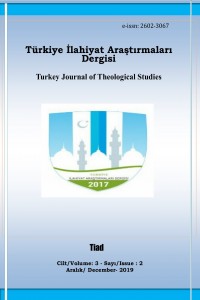Abstract
Richard Rorty'nin felsefesi, Wittgenstein'ın dil oyunları nosyonunu kendi düşüncesine adapte ettiği "söz dağarcıkları" kavramı çerçevesinde anlamını bulur. Pragmatizmin Darwinci evrim görüşü çerçevesinde dili insanın çevresiyle başa çıkmak için geliştirdiği bir alet olarak düşünmesi ve Wittgenstein'in dili kendi kuralları olan bir oyun olarak ele aldığı teorinin senteziyle ortaya çıkan görüş, Rorty'de insanın sadece kendi çevresiyle uyum iletişim kurduğu değil, kendisini, çevresini ve hatta Varlığı anlamlandırdığı düşünsel bir çerçeveye dönüşür. Tam bu noktada bir dilin içine doğan insan, çevresiyle olan bütün ilişkileriyle beraber ahlaka dair yargılarını ve değerlerini bu dili konuşmaya başlayarak elde eder. Bir dili öğrenmek, bir oyunu öğrenmektir. Bu çerçeve içinde ahlak, toplumsal dayanışma ve bir aradalığın gereği olarak ortaya konulan dil oyununun kurallarından ibarettir.
Keywords
References
- Richard Rorty,
Abstract
Richard
Rorty's philosophy finds its meaning in the context of "vocabularies"
notion which has been adapted from Wittgenstein's "language games"
notion. Rorty's understanding of language is a synthesis of two views. The
first is the pragmatist view, in which language is treated as a tool developed
to deal with environment by human. The other view is Wittgenstein's view of
language as a game with its own rules. Rorty's thought, which is formed within
the framework of these two views, expresses not only a human being's harmony
and communication with his environment, but also an intellectual framework in
which he makes sense of himself, his environment and even being. At this point,
a human being born into a language obtains his / her judgments and values
regarding morality along with all his relations with his environment by
starting to speak this language. Learning a language is learning a game. In
this framework, morality is nothing more than rules of a language game that is constituted
for social solidarity and unity.
Keywords
References
- Richard Rorty,
Details
| Primary Language | Turkish |
|---|---|
| Subjects | Religious Studies |
| Journal Section | Articles |
| Authors | |
| Publication Date | December 31, 2019 |
| Submission Date | December 13, 2019 |
| Published in Issue | Year 2019 Volume: 3 Issue: 2 |
Türkiye Journal of Theological Studies is licensed under a Creative Commons Attribution-NonCommercial 4.0 International License (CC BY NC).


